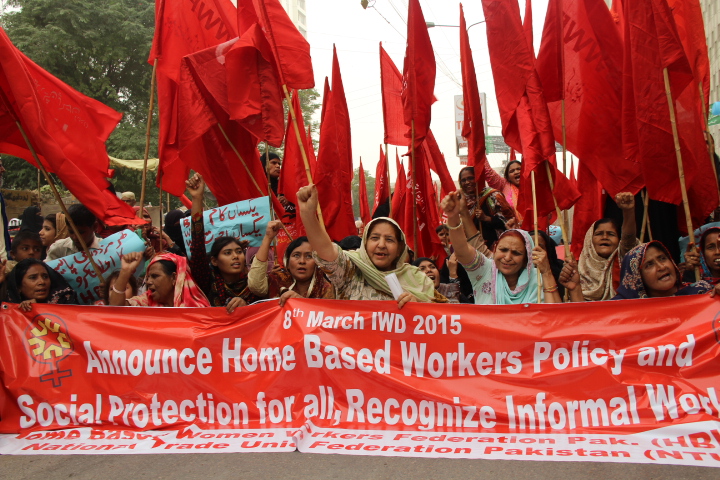By Zehra Khan, General Secretary of Home Based Women Workers Federation and Research and Education Secretary in National Trade Union Federation
Women workers held a big rally in Karachi on the occasion of International Women’s Day and demanded the Sindh government to announce the home-based workers’ policy immediately which would give home based workers of the informal sector the status of worker as per the local laws. Despite a long struggle spanning over one decade, millions of home-based workers in Sindh are deprived of their due rights and they are yet to be accepted as ‘workers’ under the labor laws. A large number of women workers from the platform of Home-based Women Workers Federation (HBWWF) and National Trade Union Federation (NTUF) staged a big rally from the Arts Council of Pakistan here to celebrate the International Women’s Day.

The rally was attended by a large number of home-based women workers, labors of different industries and sectors and also the affectees of Balida Factory fire tragedy. Workers asked the provincial government of Sindh to fulfill their promise of giving the home-based workers a home-based policy. They said this policy should be immediately announced.
The main problem of the home-based workers is their identity. Though they are the part of the supply chain of production process, but still they are not being recognized as worker as per law of land. Despite several meetings, consultations and protests, their demands are being ignored altogether. This situation could not be tolerated any longer. Rulers should pay heeds towards this genuine problem; otherwise, the workers would have no option but to protest.
The day of 8th March holds a historic importance, as it has emerged as a symbol of struggle of women workers of world against long excesses and atrocities. Society would not progress till accepting the rights of women workers and considering them as citizens with equal rights.
Millions of Pakistani women are the equal partner in the production process but are deprived of all their basic rights. In the economy of Pakistan, the share of informal sector is more than 80 percent. However, in the informal sector about 70 percent workers are women and their number is rising sharply. According to one estimate their number is 16 million but they are deprived of their due rights as labor. All these women workers are the part of the supply chain of production process, having more than 40 percent share in the national economy.
As these workers are mostly not skilled, there is no specific pay scale for them. The sitting government of Sindh province despite their electoral promise of solving the problems of home-based women workers and labors on priority has yet to solve these issues. However, the ruling party despite having solid majority has failed to approve the home-based workers policy, which has been pending with the chief minister for two years. When the government approves the bills against harassment of women and below-age marriages; it should also announce the pending home-based policy and get it implemented, so that the millions of workers could be given their rights as per the constitution of the country, as well as, the international laws.
Addressing the rally, central leader of HBWWF Saira Feroz said in the country the number of home-based workers is increasing sharply. However, for the government, it seems that the problems of workers are no more any problems. She said these workers due to poor working conditions have been braving different diseases. They are not paid their wages on time. Millions of home-based workers are using their homes as factories and they produce goods for industrialists. However, they pay the electricity, gas and other utility bills of their homes/workplaces, themselves. In 80 percent localities of Karachi home-based workers are actively taking part in the production process, but braving abject poverty. She said the home-based workers have started a movement against this exploitation, which would prove to be a milestone for a sustainable social change.
NTUF president Rafiq Baloch said though millions of labors are working in the informal sector but the government data is fully silent about them, despite the fact that such data plays a vital role in economic planning and development. This also shows the ineptness of the government departments.
The government of Pakistan has rectified more than 37 international labor conventions and also got the status of GSP Plus in the year 2014. However, the workers of the informal sector are yet to be recognized as workers. They didn’t get social protection. In the non-formal sector, the women workers are in majority and they should be registered under social protection net. The government should make effective laws in this regard.
Vice President of Baldia Factory Fire Affectees Association Saeeda Khan said today is the day to remember those women workers who embraced martyrdom on 11th September 2012 in the factory fire in Ali Enterprises, Karachi. This is also the day to remember the women who lost their loved ones in the fire tragedy. However, the government did not learn any lesson from this tragedy. This is why that even today our factories, industries and workplaces are running as virtual slaughter houses for workers. She suggested changing this dismal scenario and to launch a big movement.
The women participants of the rally demanded the following:
-To announce the home-based workers’ policy immediately.
–Government should ratify ILO convention C177 and include it in the policy, besides ensuring its implementation.
-Home-based workers should be registered and their contactors should be included in the ambit of registration.
-Social protection of workers should be ensured including the facilities of healthcare, education, jobs and pension.
– All home-based workers should be accepted as workers under the labor laws and given all facilities as per law.
-Inequality in wages on gender discrimination basis should be stopped.
-Industry-wise data of the home-based workers should be gathered.
-The issues of home-based workers should be included in the agenda of labor movement.
-The rights of workers under the ILO conventions and GSP Plus should be respected and implemented.





